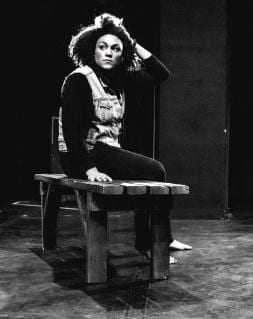Kathleen MacDonald exudes a confidence that belies her age. Still in her final year of Ryerson’s acting program, the 21-year-old Halifax native already has her sights set on a professional career.
“I’m ready to be out in the real world and become an adult,” she laughs. “Naturally I’m a little nervous because it’s a tough business. But I really think there’s a place out there for me in terms of the representation of different ethnicities in the kind of work that’s being produced right now.”
But before she launches into the big leagues, MacDonald has another six months of school. Her current project is Russian writer Maxim Gorky’s rarely performed 1904 play Summerfolk. Focused on the hopes and anxieties of the Russian bourgeoisie at the turn of the century, the play follows a cast of doctors, lawyers, writers and businessmen as they get drunk, argue and lament the state of their lives.
MacDonald plays Pustobaika, an old man who acts as the voice of the people, challenging the beliefs of the upper class.
“He’s a sort of all-knowing figure,” she says. “It’s awesome to really push myself outside the kinds of roles I’m normally offered. Obviously I’m biased, because I think my class is super talented, but I think this is a show everyone should see. It’s a chance to catch a play that’s not done very often.
“As an added bonus, you’ll get to check out some university boys in early-1900s-era one-piece swimsuits.”
MacDonald was acting well before she got to Ryerson, both in her high school drama club and other companies in Halifax, two communities she credits with helping her coming-out process.
“Creative people are really open-minded, so it wasn’t hard to find support during that period,” she says. “I was also lucky to have a great relationship with my family. Of course, everyone has those fears about whether they’ll see you as a completely different person or think they made some mistake in raising you. But both my parents were great, though obviously not everyone has it that way.”
Though her high school had a gay-straight alliance, MacDonald wasn’t particularly involved. Partly because she already had the needed support, but also because she found the group didn’t always fulfill the needs of queer students.
“I support GSAs in every school and I think they serve an important function just in existing,” she says. “But I also feel like they can lag behind the times a bit. They tend to just be a group of queer kids and their allies sitting around talking once a week. But they almost never touch on issues like sex or safer sex practices.
“I think they’re a good starting point for promoting acceptance,” she adds. “But I don’t think students should feel like there’s only one safe space in their schools. We should be working to ensure every part of the school is a safe space and every teacher is treating all of their students as equals.”
Summerfolk
Fri, Oct 26 – Fri, Nov 2, 8pm
44/43 Gerrard St E
ryersontheatre.ca


 Why you can trust Xtra
Why you can trust Xtra


